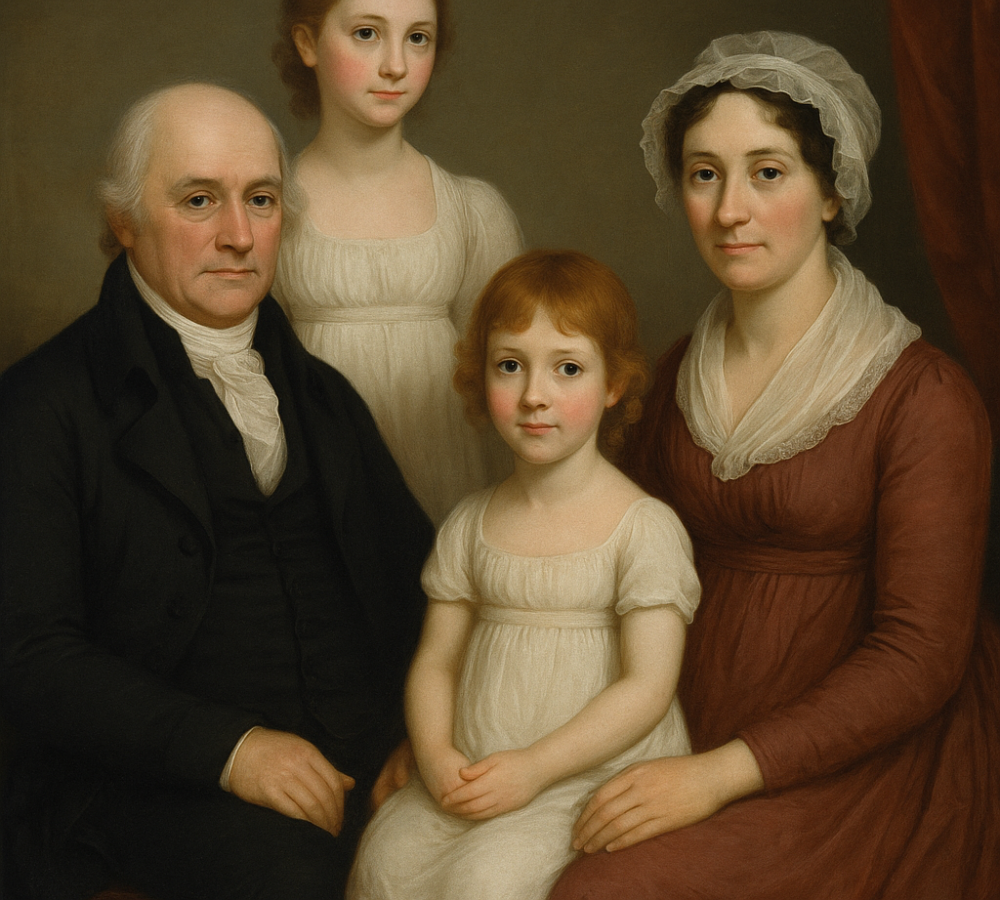Timeless Simplicity: The Langdon House Of Plymouth, NH
Where Federal elegance meets New England legacy in a quiet corner of history.
Langdon House stands as a testament to the refined simplicity and structural elegance of Federal-style architecture. This style, dominant in the early 19th century, is all about balance and symmetry, hallmarks visible right from the home’s stately façade. Think symmetrical windows and doors, perfectly proportioned to convey a sense of order and grace. It’s like the house is whispering calm and permanence.
Inside, traditional design elements continue the story. The central hallway greets you with its straightforward layout, channeling the spirit of an era that valued function coupled with elegance. The detailed moldings and original woodwork aren’t just decorative; they are storytellers, taking us back to a time when craftsmanship ruled. Here, builders didn’t cut corners. They poured skill and attention into every joint and cornice—something that today’s quick builds often lack.
Preservation is a big deal at Langdon House. Keeping this gem looking as it did in its prime involves a dedicated effort to maintain authenticity. Restorers rely on original materials and techniques, understanding that authenticity matters. The sense of walking through history—unchanged and unhurried—makes all the effort worthwhile.
 The Langdon House as it appears today—an elegant white clapboard home reflecting the timeless balance and symmetry of Federal-style architecture in New England.
The Langdon House as it appears today—an elegant white clapboard home reflecting the timeless balance and symmetry of Federal-style architecture in New England.
For those with a passion for period architecture or just an appreciation for beautifully crafted spaces, wandering around Langdon House can offer an inspiring glimpse into another world. It’s all about soaking in the heritage and standing among walls that have witnessed centuries of stories. The house isn’t just a shelter; it’s a masterpiece of artisanal brilliance, and understanding it is like taking part in a conversation with the past.
 The central hallway of Langdon House—showcasing original woodwork, period details, and the quiet craftsmanship that defines early 19th-century New England architecture.
The central hallway of Langdon House—showcasing original woodwork, period details, and the quiet craftsmanship that defines early 19th-century New England architecture.
👨👩👧👦 The Langdon Heritage: A Family’s Enduring Impact
The Langdon family isn’t just part of New Hampshire’s history; they’re woven into the very fabric of New England’s legacy. John Langdon, a prominent figure in American history, played significant roles as a Revolutionary War patriot, a signer of the U.S. Constitution, and a three-term governor. While John himself wasn’t a resident of this home, his extended family certainly left their mark across Plymouth, influencing its social and political realms.
 A traditional portrait capturing the refinement and family values of early New England society, evoking the era in which the Langdon family helped shape New Hampshire’s civic legacy.
A traditional portrait capturing the refinement and family values of early New England society, evoking the era in which the Langdon family helped shape New Hampshire’s civic legacy.
The Langdons weren’t merely passive architects of history. Local lore tells of their deep involvement in Plymouth’s civic life, from legal circles to academic pursuits. This is a family that helped shape New Hampshire’s intellectual and cultural growth, with ties even to Plymouth State University. Such contributions cemented the Langdon name in local heritage, carrying forward ideals of civic duty and ethical leadership.
What makes the Langdon family’s story so captivating is how their values shaped the community. While John Langdon stood on the national stage, back home, his kin upheld the same spirit, engaging in efforts that resonated with the civic mindfulness and educational aspirations of their time.
Visiting Langdon House allows you to walk the same paths as this historic family, reflecting on their enduring ideals. It’s not just about bricks and mortar; it’s about understanding the people who helped form a state’s identity. Engaging with their story can offer a deeper appreciation for the sacrifices and passions that built the community we see today.
🌄 Plymouth’s Evolution: From Colonial Town to Cultural Hub
Plymouth, with its quaint charm, didn’t always buzz with activity. It strolled through time, gradually growing into the lively cultural hub it is today. This transformation is rooted in its colonial past, where the Langdon House plays a significant role. Situated in the heart of Plymouth, the home wasn’t just a residence; it was a witness to a town discovering its identity.
Back when the Langdon family were local influencers, Plymouth began to morph into a buzzing center of education and culture. The presence of institutions like Plymouth State University injected academic vigor into the town, linking past ideals with future potential. Langdon House stood as a silent observer, watching generations evolve and contribute to the town’s intellectual legacy.
 An autumn view of a classic New England village—capturing the quiet evolution of towns like Plymouth as they grew from colonial roots into centers of community and culture.
An autumn view of a classic New England village—capturing the quiet evolution of towns like Plymouth as they grew from colonial roots into centers of community and culture.
Let’s not forget the symbiotic relationship between Langdon House and Plymouth’s educational scene. The House itself embodies the values preached by the university: preservation, education, and cultural pride. It’s where history and academia meet, creating a space that nurtures curiosity and learning.
Walking through Plymouth today, you sense this rich fusion of history and modernity. It’s a place where historical structures coexist with vibrant student life and dynamic community events. For those exploring the town, connecting the dots between Langdon’s colonial past and today’s cultural landscape offers a compelling narrative of growth, resilience, and community spirit.
🎟️ Experiencing History: Visiting Langdon House Today
Langdon House today isn’t just a historic relic; it’s a living piece of history that invites exploration and appreciation. Set in picturesque Plymouth, this home offers history buffs and casual visitors a look into the past while remaining very much a part of the present.
For those eager to explore, Langdon House opens its doors for select heritage tours and civic events. It’s not a full-scale museum, but that’s part of its charm. A visit feels more like stepping into a family’s history, preserving the intimacy and authenticity of the original structure. Keeping an eye on the Plymouth Historical Society’s updates will help plan your visit, as they often host seasonal open houses and events.
Preservation isn’t just about keeping old walls standing; it’s about engaging the community in its rich history. The efforts here are fueled by a local passion for conserving architecture and a shared responsibility to celebrate the past. With its exterior maintained to historic standards, the house stands not as a static exhibit, but as a living reminder of times gone by.
If planning a visit, it’s a good idea to check in with the New Hampshire Division of Historical Resources or local tourism boards for details on tours or special events. These resources can offer insights into what might be happening during your visit—like reenactments or historical lectures—that enrich the experience.
Visiting Langdon House doesn’t just offer a stroll through history; it provides a unique chance to engage with the narrative of a town and a legacy that continue to shape New England’s cultural tapestry. So take a step back in time when you’re in Plymouth, and let these walls speak to you of a storied past.
📜 Lessons from the Past: Langdon House as a Reflection of Timeless Values
Langdon House isn’t just about history; it’s a reflection of timeless values that resonate even today. It encapsulates a period when modesty, tradition, and civic-mindedness stood as the foundation of community life. Embracing these lessons helps us appreciate what built the neighborhoods and towns we cherish now.
Walking through the house, it’s evident that these values are imbued in the woodwork and the very layout of the home. The straightforward design tells of a period where function met no-nonsense living, something easily overlooked in our fast-paced world. There’s a comforting simplicity in how life was conducted, suggesting that sometimes, less really is more.
 Langdon House in full summer bloom—a living example of preserved history surrounded by the vibrant beauty of a New England garden.
Langdon House in full summer bloom—a living example of preserved history surrounded by the vibrant beauty of a New England garden.
At Langdon House, it’s clear that architecture can both preserve beauty and convey moral teachings. The preservation of the home itself is a testament to the value placed on historical integrity. It serves as an educational tool, offering insights into the lifestyles and ethical frameworks of early colonial New England.
Appreciating these elements isn’t just an exercise in nostalgia. It helps remind us that the essence of community and the strength of individual contributions are as vital today as they were back then. The Langdon family, through their enduring legacy, illustrates the impact of a value-driven life, inspiring both locals and visitors alike.
As you explore, consider the role of historical homes like Langdon in preserving these invaluable lessons. It’s about more than just architecture; it’s about embracing stories that shape our identities and our communal spirit. Each visit to Langdon House is a nod to the past, helping ensure these timeless principles remain part of our cultural conversation.
